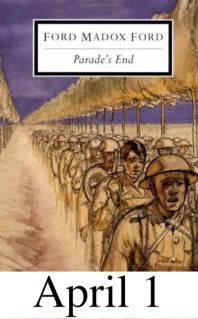The Last Post, named for a traditional British Army bugle call to commemorate a fall compatriot, is the final book in Ford Madox Ford tetralogy set in the WWII era in England and France. The prose in the opening chapter of this book seems to have a quieter less dissonant feel to it than one finds in the parts of the book that deal directly with Tietjens's WWI experiences. It is as if the book is itself calming on winding down to mirror the effects of armistice.
As The Last Post opens we get to know a lot better Mark Tietjens, brother of Christopher our central character, and his mistress. His mistress is French and has a back ground in the theatrical arts. A good bit of the opening parts of the Last Post passages through her consciousness and her concerns over her failure to get the unmarried Mark to make her his wife. Perhaps this is meant as a not too funny play on the state of post war French-English relationships. She is also reflects upon what seems to her the passing of an era of civilized values into one of anarchy:
They had only to read in the papers of the deeds of assassins, high way robbers, of the subversive and ignorant who everywhere seized the reigns of power.One of the themes in Parade's End is the feeling among the characters that the world they know is coming to an end. As I read the lines above (and many similar reflections in Parade's End on the post WWI world) I could not help but have come to mind these lines from W. B. Yeats (1919)
Turning and turning in the widening gyre
The falcon cannot hear the falconer;
Things fall apart; the centre cannot hold;
Mere anarchy is loosed upon the world,
The blood-dimmed tide is loosed, and everywhere
The ceremony of innocence is drowned;
The best lack all conviction, while the worst
Are full of passionate intensity.
Surely some revelation is at hand;
Surely the Second Coming is at hand.
The Second Coming! Hardly are those words out
When a vast image out of Spritus Mundi
Troubles my sight: somewhere in the sands of the desert.
I think the historical lesson, if we can use this word, the Ford is conveying is that what seems like an end is merely a transformation. The terrible changes that some of the characters in The Last Post speak and think on are in fact them inflating a set of changes that disadvantages them into a social apocalypse in which all values are swept away.
It seems to me the narrator in The Last Post becomes somehow odder and manifests his social prejudices more openly than before. It is as if the narration of the book (done in a seemingly but hardly in fact omniscient way) is having increasing difficulty with the social changes brought on by WWII. We see this in the numerous unfavorable references to Americans, to the French and the disturbing way middle eastern Jews are characterized. Here is the purpose in life of a minor character, Mrs de Bray Pape:
The lady said it was precisely giving lessons in history to the dissolute Aristocracy of the Old World that was her mission in life.
Here is very interesting few lines from the conscious of the General who is involved with Sylvia and was at times the commander of Christopher:
Christ was a sort of an Englishman and Englishmen did not as a rule refuse to do their jobs. They had not used to, now they no doubt did...perhaps Christopher was a symptom of how the English were changing.
The Last Post has some very interesting things to say about the relationship of the sexes. It seems Sylvia is making a crasser than ever effort to make her husband Christopher's life miserable with no real intention of leaving a man she seems to hate. We also learn some to me surprising things about the treatment of the returning British soldier by society at large. Overall, a lot can be learned from Parade's End on an amazing range of topics. I know longer view it as an encyclopedic narration of sorts and I am starting to see it, as reflected in the narrative method (Tietjens hobby of finding errors in the Encyclopedia Britannica kind of-but maybe too obvious-clue to this) kind of statement to the effect that an era has begun which does not lend it self to encyclopedic narratives has begun. There is a lot more I would like to say on The Last Post but I am still struggling with the work thematically and will do a final over all post on Parade's End very soon. For sure it is a supreme work of art, if a maddening one at times. I will try to go more into my over all impressions soon.
I am very grateful for the very high quality of posting from the other participants in the read along.
Dwight of A Common Reader -Dwight also has a very good resources Page on FMF.
Each has done multiple postings on the work and each has very insightful things to say.
I think a few others may soon post on it also and look forward to reading their thoughts.
I will do one more overall post.


No comments:
Post a Comment